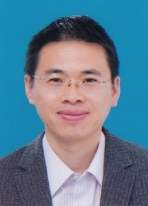Keynote Speakers

Prof.
Youfu Li (IEEE Fellow)
City University of Hongkong
Prof. Li received the B.S. and M.S. degrees in electrical engineering from Harbin Institute of Technology China. He obtained the PhD degree from the Robotics Research Group, Dept of Engineering Science of the University of Oxford in 1993. From 1993 to 1995 he was a postdoctoral research staff in the Dept of Computer Science, University of Wales, Aberystwyth, UK. He joined City University of Hong Kong in 1995 and is currently a professor in the Department of Mechanical Engineering. His research interests include robot sensing, robot vision, 3D vision, visual tracking, sensor guided manipulation, mechatronics and automation. In these areas, he has published over 180 papers in SCI listed international journals. Dr Li has received many awards in robot sensing and vision including IEEE Sensors Journal Best Paper Award by IEEE Sensors Council, Second Prize of Natural Science Research Award by the Ministry of Education, 1st Prize of Natural Science Research Award of Hubei Province, 1st Prize of Natural Science Research Award of Zhejiang Province, China. He was on Top 2% of the world’s most highly cited scientists by Stanford University, 2020. He has served as an Associate Editor of IEEE Transactions on Automation Science and Engineering (T-ASE), Associate Editor of IEEE Robotics and Automation Magazine (RAM), Editor of the IEEE Robotics Automation Society's Conference Editorial Board (CEB) and Guest Editor of IEEE Robotics and Automation Magazine (RAM).

Prof.
Honghai Liu (IEEE/IET Fellow)
Harbin Institute of Technology/University of
Portsmouth
Honghai Liu received the PhD in intelligent robotics from King’s College London, UK. He is interested in multimodal sensing, neurorobotics and embodied intelligence for theory and applications with an emphasis on approaches that could make contribution to the intelligent connection of perception to action using contextual information. He has authored/co-authored more than 400 peer-reviewed journals and conference papers with several best paper awards. He is Member of Academia Europaea, Fellow of IEEE/IET.
Speech Title: "Embodied Intelligence for Early Screening and Intervention for Autism Children"

Prof.
Shandong Wu
University of Pittsburgh
Shandong Wu, PhD, is a Professor in Radiology, Biomedical Informatics, Bioengineering, and Intelligent Systems at the University of Pittsburgh, and is an Adjunct Professor at the Carnegie Mellon University. Dr. Wu leads the Intelligent Computing for Clinical Imaging (ICCI) lab. He is the founding director of the Pittsburgh Center for AI Innovation in Medical Imaging, a cross-campus initiative including more than 130 researcher and clinician members working on medical imaging AI. Dr. Wu’s background is in Computer Science (Computer Vision) with additional clinical training in radiology research. Dr. Wu’s main research areas include computational biomedical imaging analysis, big (health) data coupled with machine/deep learning, and AI in clinical studies and informatics, primarily on cancer imaging. Dr. Wu’s work focuses on developing trustworthy medical imaging AI for clinical/translational applications. Dr. Wu's lab received the prestigious RSNA Trainee Research Award twice in 2017 and 2019, and the 2021 AANS Natus Resident/Fellow Award for Traumatic Brain Injury, SPIE Imaging Informatics Best Paper Award, among other research and educational awards. Dr. Wu has published > 190 journal papers and conference papers/abstracts in both the computing and clinical fields. His research has been featured in hundreds of scientific news reports and media outlets in the world.
Speech Title: "Intelligent Computing of Medical Imaging to Transform Healthcare"

Prof. Jie
Yang
Shanghai Jiao Tong University
Jie Yang received a bachelor’s degree in Automatic Control in Shanghai Jiao Tong University (SJTU), where a master’s degree in Pattern Recognition & Intelligent System was achieved three years later. In 1994, he received Ph.D. at Department of Computer Science, University of Hamburg, Germany. Now he is the Professor and Director of Institute of Image Processing and Pattern recognition in Shanghai Jiao Tong University. He is the principal investigator of more than 30 national and ministry scientific research projects in image processing, pattern recognition, data mining, and artificial intelligence. He has published six books, more than five hundreds of articles in national or international academic journals and conferences. Google citation over 17000, H-index 65. Up to now, he has supervised 5 postdoctoral, 46 doctors and 70 masters, awarded six research achievement prizes from ministry of Education, China and Shanghai municipality. Two Ph.D. dissertation he supervised was evaluated as “National Best Ph.D. Dissertation” in 2009 and in 2017. Two Ph.D. dissertations he supervised were evaluated as “Shanghai Best Ph.D. Dissertation” in 2009 and 2010. He has owned 48 patents.

Prof.
Junzhi Yu
Peking University
Junzhi Yu received the B.E. degree in safety engineering and M.E. degree in precision instruments and mechanology from the North University of China, Taiyuan, China, in 1998 and 2001, respectively, and the Ph.D. degree in control theory and control engineering from the Institute of Automation, Chinese Academy of Sciences, Beijing, China, in 2003. From 2004 to 2006, he was a Postdoctoral Research Fellow with the Center for Systems and Control, Peking University, Beijing. He was an Associate Professor with the Institute of Automation, Chinese Academy of Sciences in 2006, where he became a Full Professor in 2012. He was an AvH research fellow with the University of Hamburg, Germany, from September 2009 to September 2011. In 2018, he joined the College of Engineering, Peking University, as a Tenured Full Professor. His research interests include intelligent robots, motion control, and intelligent mechatronic systems.
Speech Title: "Underwater Fisheye Vision Based Motion Perception and Control"

Prof.
Hesheng Wang
Shanghai Jiao Tong University
Dr. Wang Hesheng is a distinguished professor of Shanghai Jiao Tong University and the vice dean of the School of Electronic Information and Electrical Engineering. He is also the deputy director of the Technical Committee of Hybrid Intelligence of the Chinese Association of Automation and the deputy director of the Intelligent Vehicle and Robotics of the China Instrument and Control Society.Dr. Wang is/was the Editor of TRO, TMECH, TASE, RAL, IJHR, RIA, a Senior Editor of the IEEE/ASME Transactions on Mechatronics, an Editorial Advisory Board in Advanced Intelligent Systems, an Editor-in-Chief of Robot Learning. As project leader, Professor Wang chaired the National Natural Science Foundation Outstanding Youth Fund, Joint Fund Key Projects, Youth Fund, General Projects, Special Subprojects of the ITER Program of the Ministry of Science and Technology, International Cooperation Projects of the Ministry of Science and Technology, Doctoral Fund of the Ministry of Education and Shanghai Municipal Natural Science Foundation and many other projects. He was a recipient of Shanghai Rising Star Award in 2014, The National Science Fund for Outstanding Young Scholars in 2017, Shanghai Shuguang Scholar in 2019 and The National Science Fund for Distinguished Young Scholars in 2022. He was the general chair of the IEEE RCAR 2016 and IEEE ROBIO 2022. He will be the General Chair of The 2025 IEEE/RSJ International Conference on Intelligent Robots and Systems (IROS2025).
Speech Title: "Robot Vision Navigation and Manipulation"
Abstract: This report focuses on the two core functions of service robots, namely, mobility and operation. First, it provides an overview of the current status of the service robot industry and technology development and the difficulties it faces. Secondly, it introduces the main achievements of the team's long-term research on the core technical problems in mobility and operation: for the navigation problem of robots in dynamic environments, a series of positioning and navigation methods are proposed, which realize the robust perception and positioning of mobile robot vision fusion in complex large scenes; for robot operation in complex environments, an adaptive visual servo framework and a learning-based mobile operation method are created. For robot mobile operation, a set of widely practical vision-based method systems have been formed, which has improved the key common technical level of service robots.